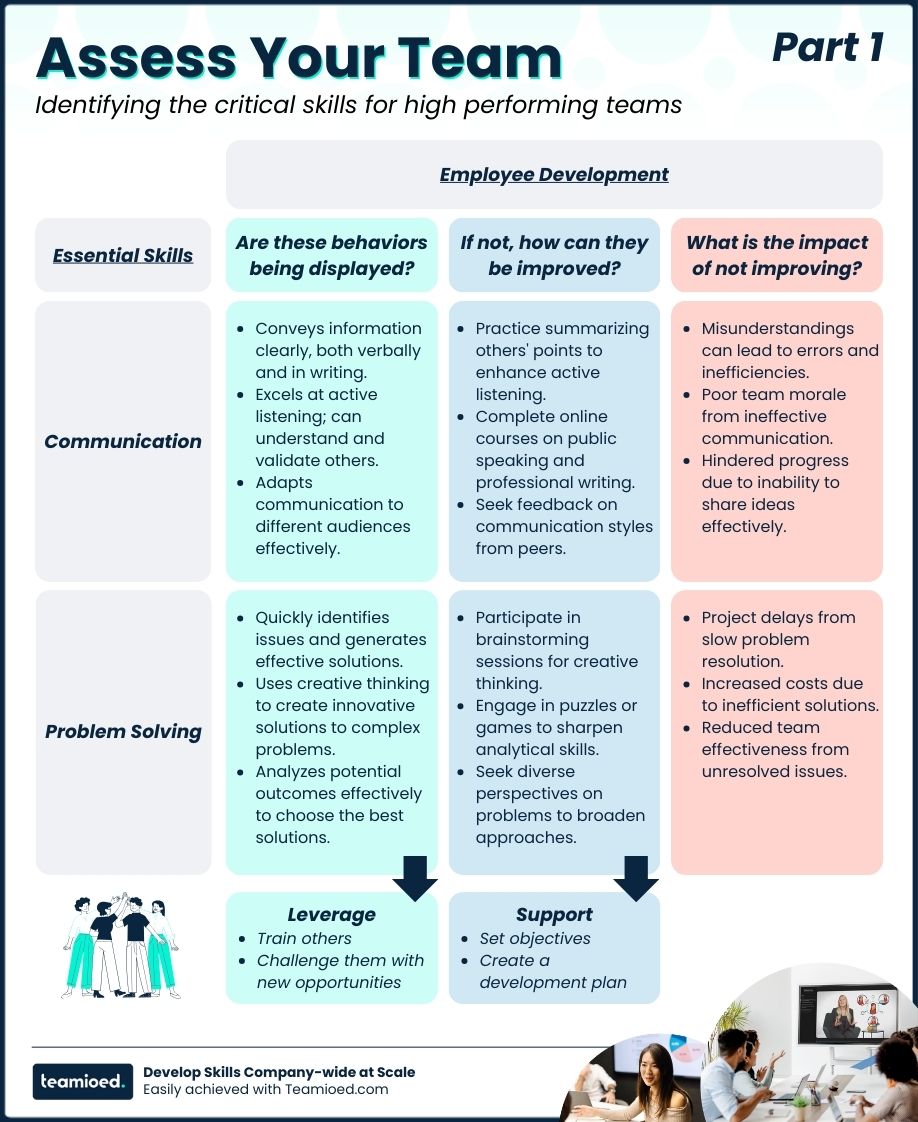Ben Kill, Chartered MCIPD
How to Assess Your Team (Part 1)

Assessing and developing critical skills within your team is essential for achieving high performance and ensuring continuous growth. In this text, we'll focus on two fundamental skills, communication and problem-solving, and provide some insights on how to evaluate and improve these skills for better team outcomes.
Effective communication is crucial in any high-performing team. This means you want every team member to be able to convey information clearly, both verbally and in writing. They should also excel at active listening, understanding, and validating others' points of view, and be able to adapt their communication styles to suit different audiences. If these behaviors are not being displayed, there are several ways to improve. You might practice summarizing others' points, which can enhance active listening skills, while online courses in public speaking and professional writing can improve overall communication abilities. Additionally, seeking feedback from peers on communication styles can provide valuable insights for improvement. Of course, the negative impact of not improving communication skills can be significant, leading to misunderstandings, errors, inefficiencies, and poor team morale.
Problem-solving is another essential skill for high-performing teams. Team members should be able to quickly identify issues and generate effective solutions, utilizing creative thinking to develop innovative solutions for even the most complex problems. They should also be able to analyze potential outcomes effectively to choose the best solutions. To improve their problem-solving skills, team members can participate in regular brainstorming sessions to foster creative thinking, or even engage in puzzles and games to sharpen their analytical skills. Finally, they should purposely seek diverse perspectives on problems so that they can broaden their approaches. Unfortunately, the consequences of not improving problem-solving skills include project delays, increased costs due to inefficient solutions, and reduced team effectiveness due to the growing number of unresolved issues.
Leaders should encourage team members to train and mentor each other in communication and problem-solving, and provide new opportunities and challenges to help them apply and further develop these skills. Additionally, managers should try to set clear objectives and create a structured development plan to ensure continuous skill enhancement. By focusing on these strategies, you can build a high-performing team that is motivated, engaged, and effective.
Effective communication is crucial in any high-performing team. This means you want every team member to be able to convey information clearly, both verbally and in writing. They should also excel at active listening, understanding, and validating others' points of view, and be able to adapt their communication styles to suit different audiences. If these behaviors are not being displayed, there are several ways to improve. You might practice summarizing others' points, which can enhance active listening skills, while online courses in public speaking and professional writing can improve overall communication abilities. Additionally, seeking feedback from peers on communication styles can provide valuable insights for improvement. Of course, the negative impact of not improving communication skills can be significant, leading to misunderstandings, errors, inefficiencies, and poor team morale.
Problem-solving is another essential skill for high-performing teams. Team members should be able to quickly identify issues and generate effective solutions, utilizing creative thinking to develop innovative solutions for even the most complex problems. They should also be able to analyze potential outcomes effectively to choose the best solutions. To improve their problem-solving skills, team members can participate in regular brainstorming sessions to foster creative thinking, or even engage in puzzles and games to sharpen their analytical skills. Finally, they should purposely seek diverse perspectives on problems so that they can broaden their approaches. Unfortunately, the consequences of not improving problem-solving skills include project delays, increased costs due to inefficient solutions, and reduced team effectiveness due to the growing number of unresolved issues.
Leaders should encourage team members to train and mentor each other in communication and problem-solving, and provide new opportunities and challenges to help them apply and further develop these skills. Additionally, managers should try to set clear objectives and create a structured development plan to ensure continuous skill enhancement. By focusing on these strategies, you can build a high-performing team that is motivated, engaged, and effective.
Want to learn more? Teamioed specializes in technology-led team experiences that empower managers to run their own team development sessions. We’ve specifically designed these discussions to complement existing meetings and create minimal disruption whilst enhancing team cooperation, efficiency, and engagement. To learn more about Teamioed’s low-cost, subscription-based platform, click here.
Explore
Legal notice: Teamioed
Limited is a limited company registered in England with registered number
14441318. Our registered office is at Suite 2453 Unit 3a, 34-35 Hatton Garden,
London, United Kingdom, EC1N 8DX. For information about how we process data and
monitor communications please see our Privacy policy and for terms of use
please see our Terms and Conditions. Our
website has been prepared for general information only and you should always
obtain professional or specialist advice before taking any action on the basis
of the content of our website or our products or services. No rights are to be derived from any proposal contained on
our website and a licence cannot be deemed granted by us until a written
agreement containing all necessary terms and conditions is fully negotiated and
executed between the relevant parties.
All logos and trademarks are the property of their respective owners and are used for informational purposes only. We are not affiliated with, endorsed by, or sponsored by any of the companies represented by these logos.
All logos and trademarks are the property of their respective owners and are used for informational purposes only. We are not affiliated with, endorsed by, or sponsored by any of the companies represented by these logos.
© Teamioed 2026
Secured with SSL

Write your awesome label here.
Write your awesome label here.

